Hemp Oil Vs. CBD Oil: What’s The Difference?
Summarize
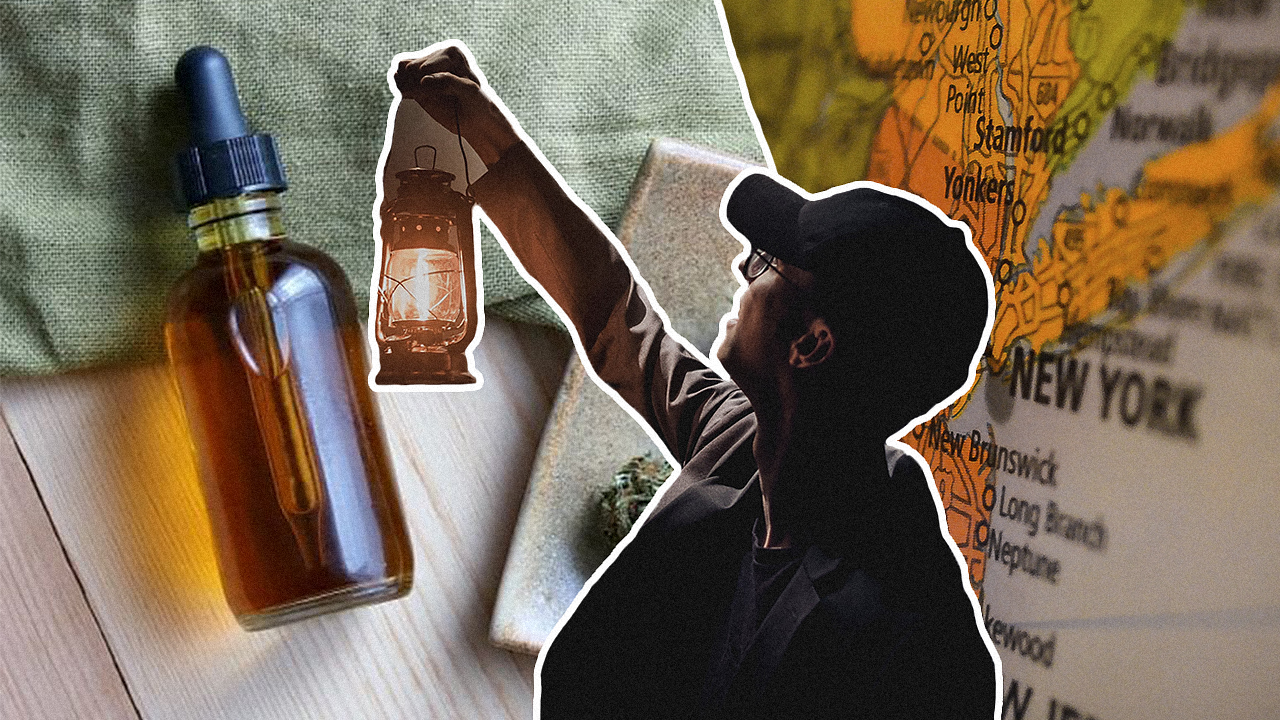
There is still so much confusion about terms like hemp vs. cannabidiol and hemp oil vs. CBD oil. The reason is that CBD and hemp oils come from the hemp plant, but that is where the similarity ends. A hemp oil product is not a CBD product; some CBD products are described as infused with hemp oil. No wonder people need clarification! People use “hemp oil” and “hempseed oil” interchangeably, but neither is CBD oil. The parts of the hemp plant used to obtain hemp oil are not the same plant parts as those used to get CBD oil.
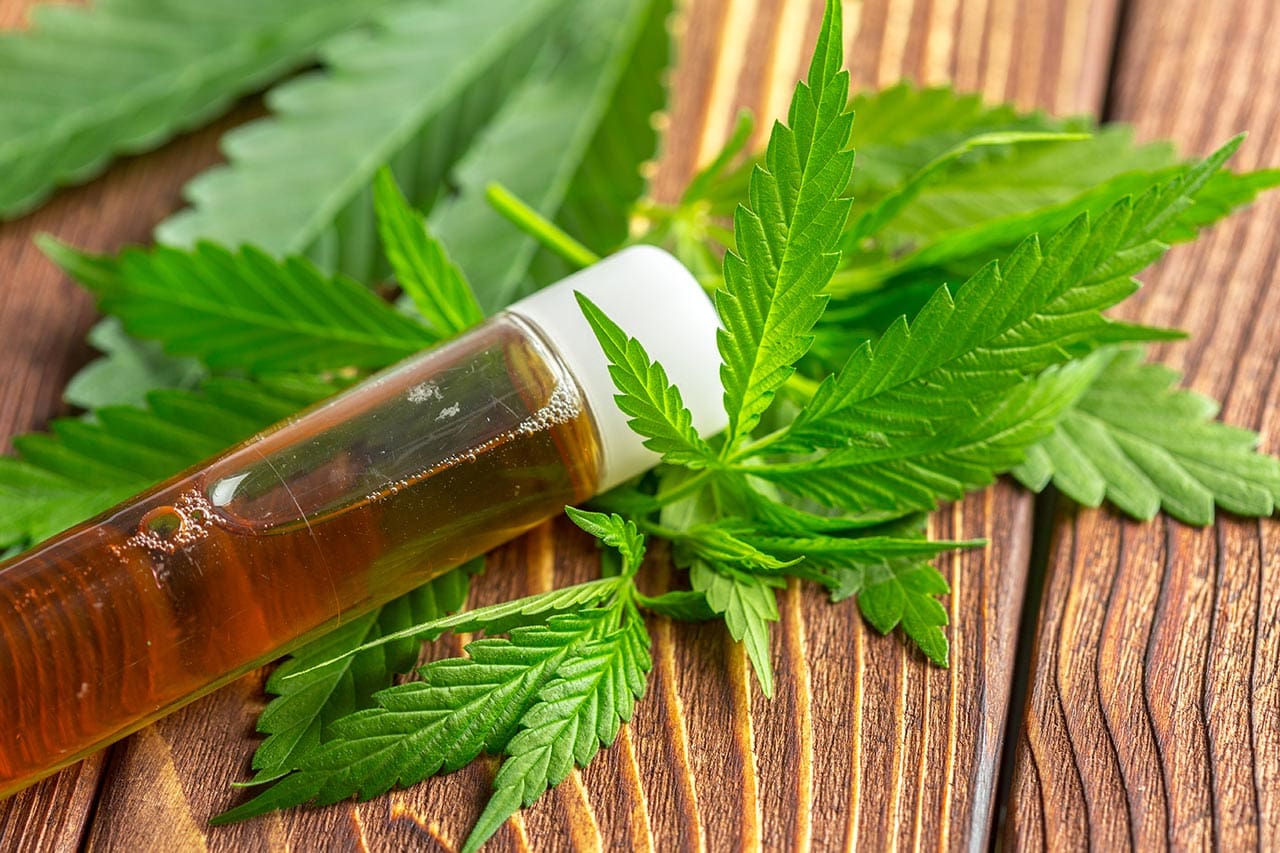
TL;DR (Too Long; Didn’t Read):
Most commonly, hemp oil means hempseed oil, which is extracted from hemp seed. Hemp oil does not contain CBD. CBD oil is extracted mainly from the hemp plant’s leaves and flowers, and some from the stalk. CBD oil is rich in CBD and other cannabinoids.
Hempseed oil is pressed from hemp seeds and contains little to no CBD (though trace CBD can occur). CBD oil (hemp extract) is extracted from cannabinoid-rich aerial parts—especially flowers and leaves (sometimes stems)—and may contain CBD plus other cannabinoids depending on whether it’s full-spectrum, broad-spectrum, or isolate.
Table of Contents
What is Hemp?
The term “hemp” differentiates a cannabis plant that contains no more than 0.3 percent THC content by dry weight. The 0.3% is the government’s way of differentiating between a cannabis (marijuana) plant with the intoxicating compound THC (tetrahydrocannabinol) and a cannabis plant that meets the 0.3% limit for THC compound. The idea is that the 0.3% THC amount is so low that it will not get anyone high.
Hemp plants used to extract hemp oil and CBD oil are called industrial hemp. So that is the foundation for understanding hemp oil vs CBD oil.
What is Hemp Oil?
Hemp oil is a product that is extracted directly from the hemp plant. All of the plants that are within the Cannabis family can produce this oil, but industrial hemp is what is typically used to make hemp oil. Industrial hemp means that this plant has been explicitly grown for commercial production.
It will not contain psychoactive substances (typically THC) that will make you high, and usually, the best quality hemp oil products are made from seeds.
What is CBD Oil?
The full name of CBD is cannabidiol. This is one of the 113 cannabinoids that occur in the cannabis plant, and it makes up forty percent of the plant’s extracted material. CBD has been researched for several years now.
It has very minimal, unwanted side effects. Many people don’t experience any unwanted side effects at all. CBD itself isn’t intoxicating, and hemp-derived CBD products are legally allowed to contain up to 0.3% THC by dry weight, which is typically not enough to make you feel high.
CBD interacts with the body’s endocannabinoid system (ECS), a network of signaling molecules and receptors that helps regulate many functions. One of the best-known receptors is CB1, which is found primarily in the brain and central nervous system. It is located on specific cells where it helps transmit chemical signals that influence how those cells respond to their environment.
Hemp and CBD Oil: Main Differences?
Hemp oil and CBD oil are two very different products. Though they may come from the same cannabis plant (hemp), there are differences between hemp vs. cannabidiol products.
1. Cannabinoid and Nutrient Content
Hemp seeds do not contain CBD and THC, so hemp oil does not contain these cannabinoids. If trace amounts are found, it is due to harvesting and processing processes in which the seed comes in contact with other plant parts.
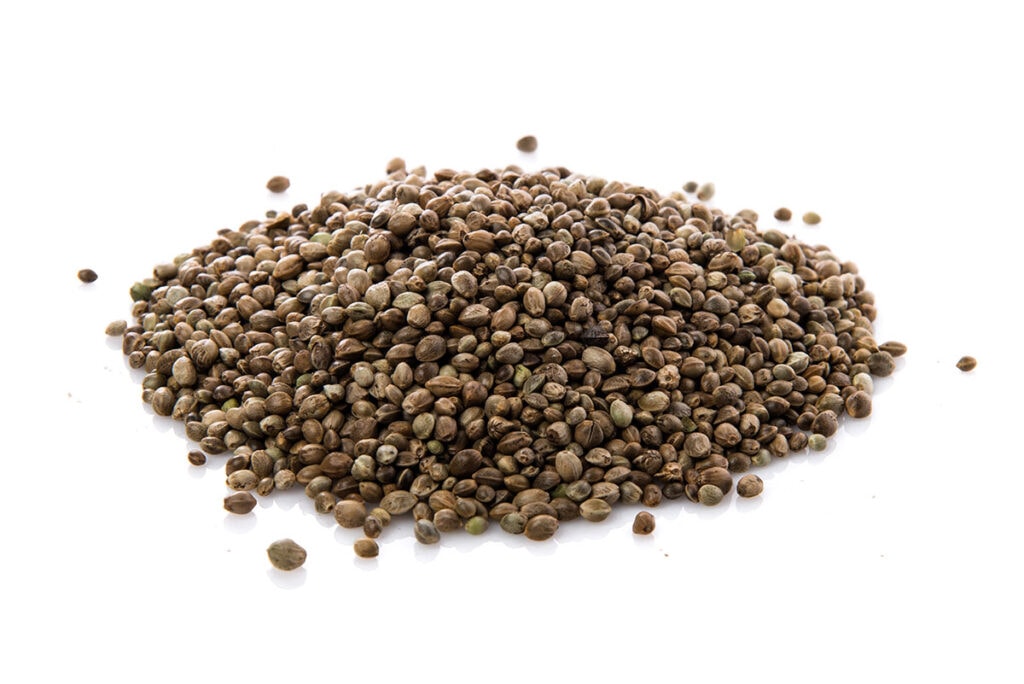
CBD oil is rich in CBD and hundreds of natural phytocannabinoids and other nutrients. Hemp oil is rich in unsaturated fatty acids, essential amino acids, and protein, but not CBD or other cannabinoids. The chemical composition of CBD oil and hemp seed oil is significantly different.
2. Different Potential Effects
CBD oil is available in three spectrums which are:
- Full spectrum CBD oil is a whole hemp plant oil containing all the cannabinoids, including CBD and THC.
- Broad spectrum CBD oil is a whole hemp plant used during extraction, but the THC is removed.
- Isolate CBD oil contains only pure CBD crystalline powder blended with carrier oil.
CBD oil contains more nutrients than hemp oil because it is made with the whole hemp plant – stalk, leaves, and flowers.
The different spectrum options give consumers a choice regarding potential effects. For example, THC in the full spectrum CBD oil binds to the CB1 and CB2 receptors in the endocannabinoid system, and CBD primarily interacts with CB2 receptors.
Full spectrum CBD and, to a lesser degree, broad spectrum CBD can deliver an entourage effect, a theory that the interaction of all the compounds working together provides an enhanced effect. Hemp oil cannot provide the same level of entourage effect.
3. Colors and Flavors
CBD oil has a dark gold color and often an earthy flavor, whereas hemp oil is a yellowish or dark to light green color and has a nutty and sometimes pungent flavor.
4. Different Effects
Hemp oil and CBD oil cannot produce the same effects because hemp oil does not have CBD. Research has shown that CBD has antioxidant properties.
5. Price
CBD oil is more expensive than hemp oil because CBD oil is more difficult to produce.
Hemp Oil, Hempseed Oil vs. CBD Oil
The word “hemp” continues to confuse people, according to various marketing organizations. While shopping for hemp-derived oil products, you will find hemp oil, hemp seed oil, and CBD oil.
For example, you can find numerous listings for CBD oil on Amazon. However, purchasing quality CBD oil on the platform can be challenging. First, Amazon has strict policies that prevent the direct sale of CBD products. CBD is technically banned on Amazon. However, some sellers find a workaround by simply creating CBD “hemp oil” Amazon listings. While CBD oil happens to be extracted from hemp, hemp does not come with the same legal restrictions as CBD oil. Selling hemp oil on Amazon is permitted because hemp seed oil is not on the list of Schedule I controlled substances. Many companies selling hemp and CBD products simply use “hemp seed oil” as a catch-all phrase for a number of products.
Hemp and marijuana are both cannabis plant species (Cannabaceae family). There are many types of cannabis plants. The word “hemp” is basically a legal term to differentiate the cannabis plant with a significant amount of the psychoactive compound THC from the cannabis plant with only trace amounts of THC. Industrial hemp is used to make hemp oil and hemp seed oil. CBD can be derived from the hemp plant or the marijuana plant.
When oils are made, different species of cannabis plants and different plant parts are used. Following is a description of the primary difference between hemp oil Vs. hempseed oil Vs. CBD oil.
Hemp Oil
Hemp oil is made from the industrial hemp plant’s flowers. The flowers have a full spectrum of cannabinoids, including CBD (cannabidiol). The oil may have a trace amount of THC, but many manufacturing processes remove all THC.
Hempseed Oil
Hemp seeds do not contain cannabinoids but have many essential amino acids, healthy fats, vitamins, and minerals. The oil is made by cold pressing only the industrial hemp plant seeds to extract the nutrients. There is no THC in hempseed oil, so some people prefer this product.
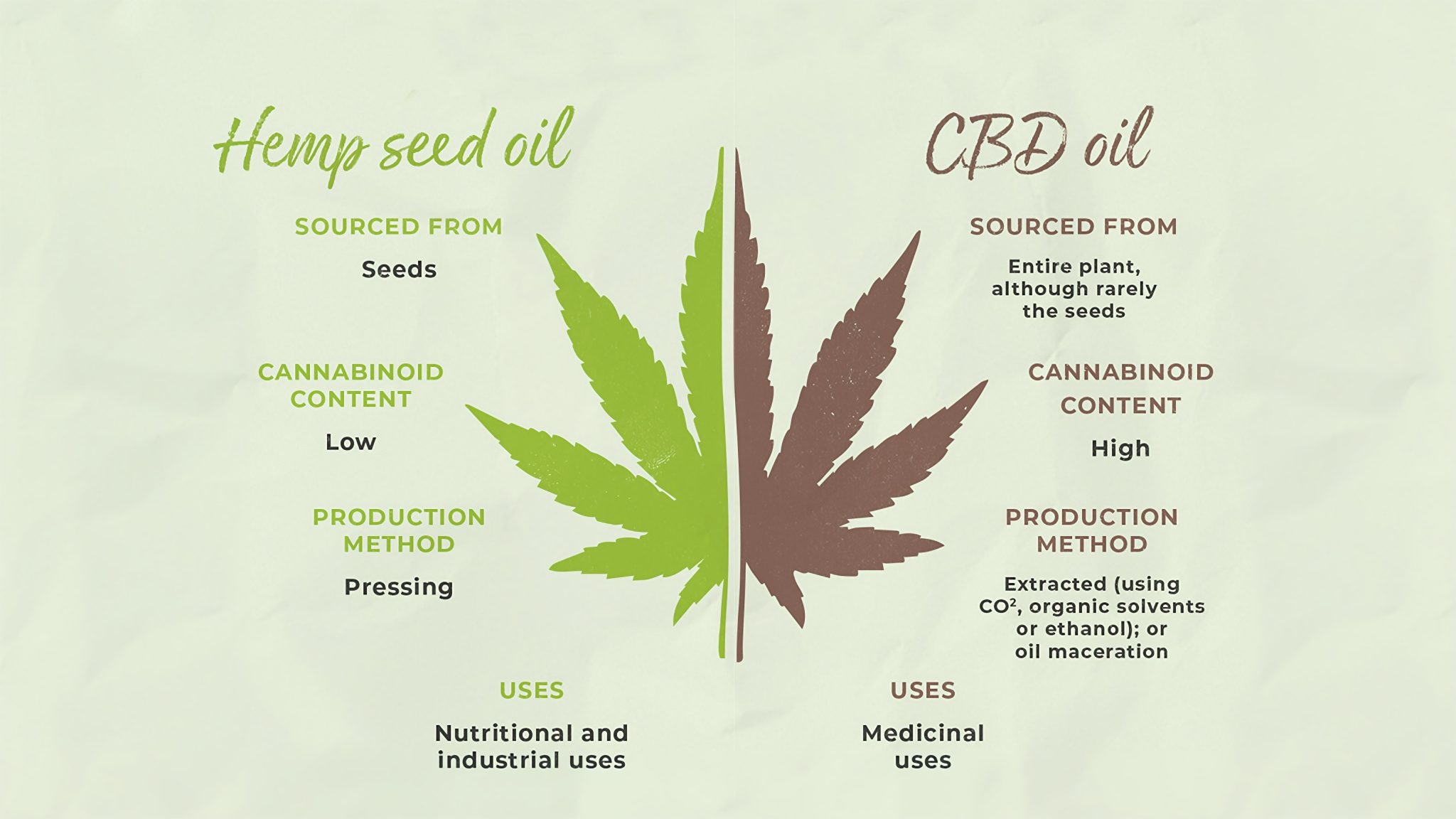
CBD Oil
CBD oil is made from either hemp or the marijuana plant. Hemp-derived CBD oil is made using the flowers, leaves, and stalks of the plant. CBD oil is produced through a process that leads to CBD full-spectrum (whole-plant extract of compounds), CBD broad spectrum (whole-plant extract of compounds but with THC removed), or CBD isolate (only CBD is stripped from the plant).
To be federally legal, the industrial hemp plant can not have more than 0.3% of the psychoactive THC. The industrial hemp plant contains high amounts of CBD.
There are some states that have legalized CBD derived from the marijuana plant for recreational and/or medical purposes. It should be noted that oil blends are sold that contain CBD and THC.
Confusions Regarding Hemp Oil and CBD Oil
Consumers need to be aware of the terminology and types of products available in the marketplace for various oils, including hemp oil, hempseed oil, and CBD oil. There are no industry terminology standards at this point so that puts the responsibility on the buyer to spend some time learning the differences between the various oils.
There is often a lot of confusion regarding hemp oil vs. CBD oil. People also assume that hemp is the same thing as marijuana. It isn’t true at all, as hemp does not contain any of the THC that marijuana does.
Hemp can contain low levels of CBD (about 25 parts per million), but CBD comes directly from the flowers of the cannabis plant or the flowers and leaves mixed with the stalks of hemp. Brands cannot label a CBD product as hemp oil and vice versa.
CBD Oil Benefits and Uses
Cannabidiol (or CBD) is a compound from the cannabis plant. While several cannabinoids come from the cannabis plant, CBD is currently one of the most popular because of its lack of THC, a THC-free CBD supplement will not cause you to feel tired or confused.
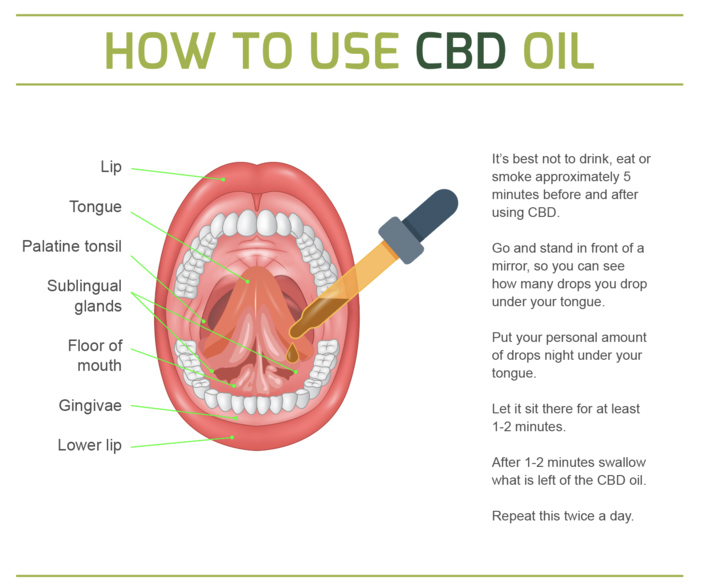
Just because you can’t obtain a ‘high’ with CBD doesn’t mean you can’t reap several significant health benefits. CBD full spectrum products provide numerous cannabinoids, all working together to help you feel your best.
The Health Benefits
The endocannabinoid system in the body works with some different bodily processes to create overall balance and wellness. CBD1 and CBD2 receptors are strewn throughout the body. When you use a CBD-based product, your body will be more in balance with the various chemicals and processes that are going on.
There aren’t many significant risks associated with the use of CBD oil. Side effects are possible when taken in large doses or when CBD oil is taken too frequently. You shouldn’t experience any of these issues when you take CBD as directed.
CBD affects your entire body in very different ways. It can activate many serotonin receptors in the body.
CBD has the potential to interact with certain prescription medications. If you think about taking CBD, you should ask your doctor about these interactions. Pregnant women and nurses should also avoid using CBD for the time being. Always do your research to ensure you’re choosing a high-quality product that will be safe and effective.
FAQs
Is CBD Legal to Use?
The legality of CBD oil varies from state to state. In 2014, a law was passed explaining that the hemp plant is different from growing marijuana. This law also stated that the legality of CBD could be determined on a state-by-state basis.
Federal law stated that CBD would be legal if the THC content in the product were lower than 0.3 percent. Certain growing conditions must be present. Some states have chosen to follow along with federal law.
Other states have set their laws to clarify what they support. Some states require a prescription for the use of CBD oil. Currently, thirty-three states have passed their legislation for CBD.
Which is Better CBD or THC?
There are different benefits associated with both CBD and THC. You can’t necessarily compare the two because they both serve their purpose. They both come from the cannabis plant, and the three main plant varieties are Indica, Sativa, and Ruderalis.
Each of these strains comes with different content of THC and CBD. CBD has plenty of benefits. It will not produce any psychoactive effect.
THC will provide the altered mental state that some people are looking for. Aside from the ‘high’ that people associate THC with, THC has some suspected benefits. This includes better quality of sleep, promoting relaxation, and perking up the appetite.
There are CBD products that will contain THC, but manufacturers strive to produce products that have less than 0.3 percent THC in them. For many states, this is part of the CBD law. Anything over 0.3 percent THC would be illegal to market.
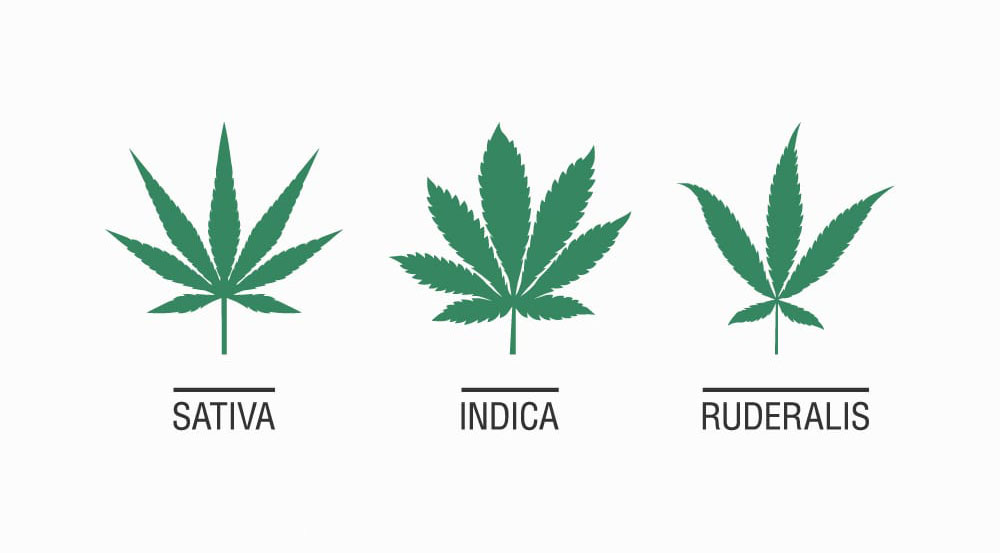
What’s the Best Way to Take CBD?
Consumers most commonly utilize CBD by taking it orally. The majority of products come in a concentrated drop form. You should read the instructions carefully before administering your first dose. Check our guide about the use of CBD oil usage here.
The most common process is placing the recommended product amount under your tongue. It is absorbed relatively quickly.
You can then swallow the product. It is essential to let the product be absorbed under the tongue as long as possible. This prevents your digestive system from breaking the products down too quickly. Other products include edibles, dissolving strips, vape liquid, and capsules. Topical products come in the form of creams, balms, lotions, roll ons, and many others.
Separation and settling often occur with many of our products. Always start with the recommended dosage and work your way up from there. Depending on what you are using the product for, you may be able to use the product once per day. Other people use it multiple times throughout the day.
If you are unsure what dose to start with, contact the brand directly. Each brand is created differently and will have its level of potency. There is not one single CBD user manual that will dictate how a product should be used.
Do CBD Oil and Hemp Oil Get You High?
CBD oil and hemp oil will not get you high. They legally cannot be produced from hemp plants that contain more than .3 percent THC, the psychoactive compound in the cannabis plant.
Is Hemp Oil as Good as CBD Oil?
Hemp and CBD oil are excellent but different products. Hemp oil and CBD products contain cannabinoids that many believe deliver physical and emotional benefits. Hemp seeds are a good source of vitamins, minerals, and fatty acids, all proven healthy nutrients.
Can You Rub Hemp Oil on Skin?
Yes, you can rub hemp oil on your skin to help relieve dry skin or skin irritation. Some people have said that hemp oil has helped them. Hemp oil will not clog pores. You can use hemp oil, topical salve, or cream made with hemp oil.
Does Hemp Oil Make You Sleepy?
Hemp oil by itself is not likely to make you sleepy. However, there are hemp oil and hempseed oil products that contain melatonin. Melatonin, produced by the pineal gland, is a natural hormone that helps to regulate the sleep/wake cycle. The melatonin supplement added to hemp oil is either synthetic or natural, with the natural form coming from animal glands.
Does Hemp Oil Contain THC?
As described earlier, hemp oil may contain a trace of THC if the element is not fully removed. Many products will indicate that hemp oil has zero THC. Hempseed oil does not contain THC or any other cannabinoid.
What Are the Side Effects of Hemp Oil?
Every person is unique, of course. Most people experience no side effects except those they wanted – like increased relaxation or reduced skin dryness. Much more medical research is needed to identify potential side effects. Some people are allergic to hempseed. Since research is limited, it is important to use a small amount of hemp oil the first couple of times to ensure you do not experience unwanted side effects.
What are the Benefits of Good Hemp Oil?
The nutritional content of good hemp oil delivers a range of benefits that promote good health. For example, the omega-3 and omega-6 unsaturated fats plus nine essential amino acids are used to make protein. Hempseeds also contain significant iron, other minerals, and vitamins. With much more medical research needed, the benefits of good hemp oil are primarily identified through people’s descriptions (anecdotes) of their experiences. They include more relaxation and reduced skin dryness.
Good hemp oil is a high-quality product that retains the desired chemical profile of the hemp plant. A study published in Frontiers in Plant Science (doi: 10.3389/fpls.2019.00120) on the National Institutes of Health site points out that quality depends on a controlled manufacturing process and the hemp plant variety used. That is why many brands operate their hemp plant farms.
Is CBD Made from Marijuana or Hemp?
Legally, CBD is made from the industrial hemp plant that is required to have less than 0.3 percent. This could change over time as the laws change. There is growing acceptance of CBD. A Gallup survey found that 14 percent of U.S. adults already use CBD products. As more people become familiar with CBD, its sales are expected to grow exponentially.
Is it Possible to Become Addicted to CBD?
You can rest assured that no, you will not become addicted to CBD if you are taking the product as recommended.
Many studies have concluded that there are no negative attributes to report regarding a potentially addictive nature. This is true regardless of who is taking the product.
Is CBD Oil Safe for Pets?
CBD is safe for use with pets. It can help with several issues relating to your pet’s health. Before starting the product, it is wise to check with your pet’s veterinarian.
You should also follow the CBD user’s manual instructions on the product. Usually, CBD oil for pets will be administered based on the overall weight of the animal. Always start with a low dose before increasing the amount. This will ensure that your pet is safe. CBD oil can be purchased for pets. There are also edible treat products that you can easily administer to your animal.
How to Choose a CBD-Rich Product?
If you have decided to try a CBD product, there are some steps you should take to ensure you are getting the highest-quality product available to you. Not every CBD product is created equally.
Before you purchase, find as much information as possible from the specific brand and CBD guide you are targeting. You want to know where the product is grown and how it is manufactured. Certain growers utilize organic means of growing. This means you won’t have a product that could be contaminated with pesticides or fertilizers. This is the preferred quality of the product for most people. Ensure that your product does not contain an illegal amount of THC.
Lastly, you can inquire about the quality control process of a brand. Each batch of CBD product should be tested to ensure its potency. This testing will also determine if the THC content is within the range it should be.
If you have any questions regarding our website, you can contact our customer service department. We can also answer questions about the specific products that we carry. You are always welcome to reach out to the manufacturer as well.
Summary
Educating yourself on CBD, hemp products, and how these items are used will allow you to make an intelligent decision for your future. It is never a good idea to start using a product you don’t know much about. Hemp and CBD oil can be beneficial when added to a healthy lifestyle. Be sure you know all about the product you are choosing to purchase.
Understand how the product is being created, how the hemp plant is being grown, what other ingredients are included, and how you can contact the brand directly. While the debate regarding CBD oil, hemp, and marijuana rages on, many people are taking matters into their own hands. You can do this as well, as long as you know everything about hemp and CBD oil.
Sources
- https://www.foodnavigator-usa.com/Article/2019/07/12/CBD-is-on-fire-says-Brightfield-but-market-remains-dogged-by-regulatory-confusion-and-unclear-terminology-surrounding-hemp
- https://www.webmd.com/diet/hemp-seeds-good-for-you#1
- https://www.webmd.com/sleep-disorders/what-is-melatonin
- https://www.webmd.com/vitamins/ai/ingredientmono-1605/hemp
- https://news.gallup.com/poll/263147/americans-say-cbd-products.aspx
- https://www.webmd.com/diet/hemp-oil-good-for-you#1
- https://www.ncbi.nlm.nih.gov/pmc/articles/PMC6381057/
- https://www.ncbi.nlm.nih.gov/pmc/articles/PMC7891210/
- https://www.aocs.org/stay-informed/inform-magazine/featured-articles/hempseed-oil-in-a-nutshell-march-2010
- https://agriculture.vermont.gov/hemp-program/hemp-seed-oil-and-cbd-concentrate-understanding-difference
- https://www.ncbi.nlm.nih.gov/pmc/articles/PMC8588477/
- https://www.news-medical.net/health/Phytocannabinoids.aspx
- https://www.fda.gov/food/cfsan-constituent-updates/fda-responds-three-gras-notices-hemp-seed-derived-ingredients-use-human-food
- https://extension.okstate.edu/fact-sheets/hemp-seed-oil-properties.html
- https://www.ncbi.nlm.nih.gov/pmc/articles/PMC7023045/
Share this post


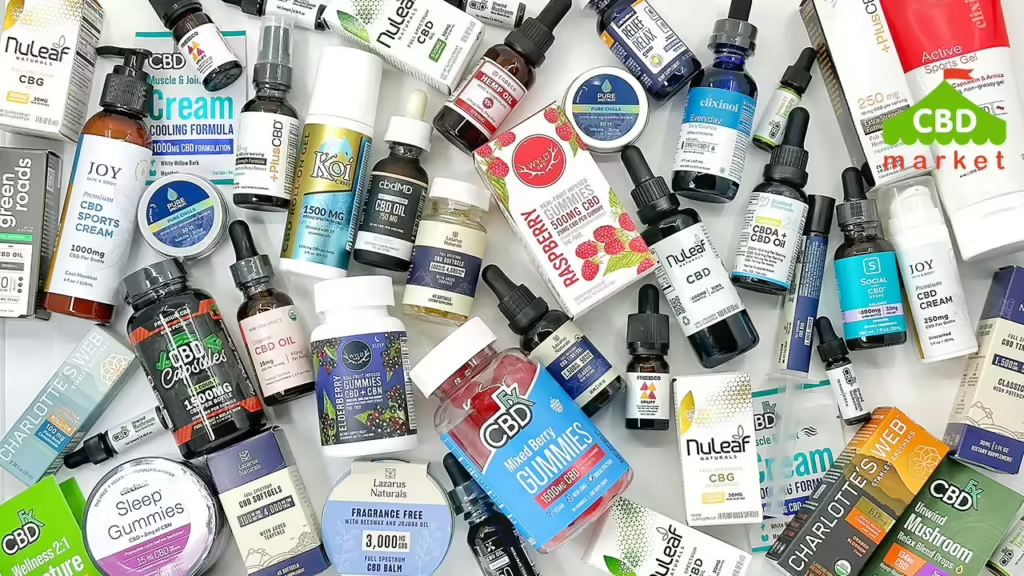
Walter Jones
Excellent post. I’m dealing with many of these issues as well.
Rebecca R
Great post.